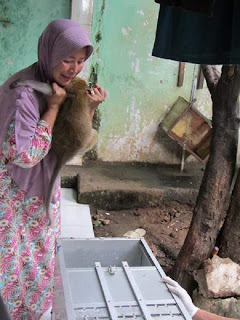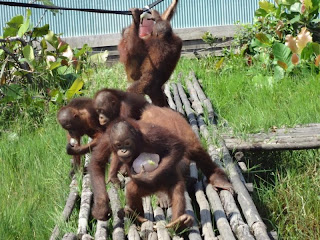On 3rd January, James, an infant male pig-tailed macaque, was brought in to our rescue centre in Ciapus by an expatriate European family living in Indonesia, who had kept him as a pet for 2.5 months. James is an extremely active young macaque, and our mandatory tests on arrival confirmed that he was healthy.
 What to do with very young primates is always a challenge. Like human infants, they need a lot of affection, love and care, but if that is provided by IAR staff, there is a danger that they will become too dependent on humans, and jeopardise their chances of rehabilitation and eventual release, the ultimate goal of our project. Luckily, not long after we confirmed he was healthy and unable to pass any disease to other macaques, we were able to place him in a cage with Nonong, an independent adult female, who we hoped would adopt James and raise him herself. IAR staff were all tentative as we introduced them to each other, but as it turned out, there was nothing to be concerned about. Nonong and James have developed a strong bond, and Nonong is an extremely attentive mother, happy to share her food with James and indulgent of his rather boisterous character.
What to do with very young primates is always a challenge. Like human infants, they need a lot of affection, love and care, but if that is provided by IAR staff, there is a danger that they will become too dependent on humans, and jeopardise their chances of rehabilitation and eventual release, the ultimate goal of our project. Luckily, not long after we confirmed he was healthy and unable to pass any disease to other macaques, we were able to place him in a cage with Nonong, an independent adult female, who we hoped would adopt James and raise him herself. IAR staff were all tentative as we introduced them to each other, but as it turned out, there was nothing to be concerned about. Nonong and James have developed a strong bond, and Nonong is an extremely attentive mother, happy to share her food with James and indulgent of his rather boisterous character. James was the second baby macaque that had been brought to our centre in the last few months. On 25th November, Dora, a female long-tailed macaque, was bought in by staff from the Jakarta Animal Aid Network. Dora was quite thin and extremely anxious when she first arrived, but in otherwise good health. After spending sometime in quarantine, building up her strength and getting accustomed to her new surroundings, it was decided that we would introduce her to Joy, an adult long-tailed female. Like James and Nonong, the introduction went well, and Dora and Joy now share a large enclosure together, and it’s lovely to see them play together, using the enrichment we provide and sharing food.
James was the second baby macaque that had been brought to our centre in the last few months. On 25th November, Dora, a female long-tailed macaque, was bought in by staff from the Jakarta Animal Aid Network. Dora was quite thin and extremely anxious when she first arrived, but in otherwise good health. After spending sometime in quarantine, building up her strength and getting accustomed to her new surroundings, it was decided that we would introduce her to Joy, an adult long-tailed female. Like James and Nonong, the introduction went well, and Dora and Joy now share a large enclosure together, and it’s lovely to see them play together, using the enrichment we provide and sharing food.It’s heartening to see how well Joy and Nonong have taken to motherhood, and how well Dora and James have adapted, and we hope it bodes well for their future in the wild. However, while these two may have found a foster mother and now await their release into the wild, we can’t ignore that many other macaques are kept as pets - often caught when they are very young. IAR continues to educate and create awareness about macaques used as pets and strongly discourages people from doing this NO matter how cute they are!




